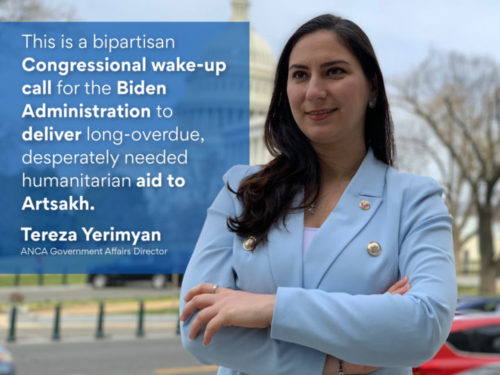ANCA-Backed Provision on Artsakh Aid included In Final 2023 Congressional Spending Bill
Biden Administration Required to Submit Artsakh Assistance Strategy within Sixty Days
December 23, 2022WASHINGTON, DC – Earlier today, both the U.S. Senate and House of Representatives cleared a massive Fiscal Year 2023 spending bill that includes an Armenian National Committee of America (ANCA) backed provision directing that the Department of State and U.S. Agency for International Development provide Congress with an “assistance strategy for addressing humanitarian and recovery needs arising from the [Artsakh] conflict” that identifies the U.S. “resources and programs,” available for this purpose, reported the Armenian National Committee of America (ANCA).
This Artsakh aid provision, now signed into law, originated in the U.S. House, under the leadership of Chairwoman Barbara Lee (D-CA) of the House Committee on Appropriations, Subcommittee on State and Foreign Operations, which is responsible for foreign aid, and was acceded to by the Senate during the conference committee process. The sixty-day timeline for the Administration report will expire in mid-February. To date, the Biden Administration has – aside from Congressionally mandated de-mining assistance, failed to provide any meaningful direct humanitarian assistance to meet increasingly desperate food, water, health, and fuel insecurity challenges faced by tens of thousands of Armenian families in Artsakh.
“This is a bipartisan Congressional wake-up call for the Biden Administration to deliver long-overdue, desperately needed humanitarian aid to Artsakh,” said Tereza Yerimyan, ANCA Government Affairs Director. “The will of our community, our coalition partners, and now of our Congress is clear. All that remains is for our State Department and USAID to reject Azerbaijan’s veto and start saving Armenian lives in Artsakh.”
The final language in the Omnibus measure confirms that the Congressional “agreement endorses language under this heading in the House report and directs that, prior to the initial obligation of funds appropriated under title IV of the Act for assistance for Armenia and Azerbaijan, the Secretary of State shall consult with the Committees on Appropriations on the proposed uses of such funds.” The referenced House text requires that, “not later than 60 days after enactment of this Act, the Secretary of State, in consultation with the USAID Administrator, is directed to develop and submit to the Committees on Appropriations an assistance strategy for addressing humanitarian and recovery needs arising from the conflict. The strategy shall identify resources and programs available to address such purpose.”
The Republic of Artsakh is enduring a growing humanitarian crisis caused by Azerbaijan’s illegal blockade of the Lachin corridor – Artsakh’s only humanitarian lifeline to Armenia, and the only route by which food, medical supplies, food and other vital humanitarian goods enter the country.
Twelve days into the blockade, Azerbaijan’s attempts to suffocate the Armenians of Artsakh has already had a devastating impact. Dozens of patients in intensive care have been denied the ability to receive life-saving treatment in Armenia, resulting in one death. Food supplies are also critically low, and quickly depleting, leaving the region’s most vulnerable at risk.
Earlier this week, the ANCA’s Yerimyan coordinated and hosted a briefing by Artsakh leaders for Congressional Armenian Caucus Co-Chair Frank Pallone (D-NJ) and over 50 Congressional offices on America’s response to Azerbaijan’s blockade.
Artak Beglaryan, the advisor to the State Minister of Artsakh; Gegham Stepanyan, Artsakh Human Rights Defender; and ANC of Artsakh’s Gev Iskajyan stressed the need for emergency humanitarian assistance and, particularly, U.S. sanctions to stop the escalation of Azerbaijani aggression.
“Unless there are serious and strong sanctions against Azerbaijan, the Azerbaijani side will continue its genocidal policy and will one day ethnically cleanse the Artsakh people. Azerbaijan wants Artsakh without the Artsakh people,” stated Beglaryan.
“Here, we are in a race against time,” stated Iskajyan. “Every day, every minute, every second that this blockade is in effect there are less supplies, there is less food, there is less medicine, there are less resources for the kids, for the population, for the elderly.” Iskajyan reiterated Beglaryan and Stepanyan’s call for Azerbaijani sanctions. “If we don’t see the cutting of military aid, if we don’t see the enforcement of sanctions, Azerbaijan will not show movement on this end.”
Since December 12th, the first day of the blockade, the ANCA has been working with the White House, State Department, and Congressional leaders – urging them to stop U.S. military assistance to Azerbaijan and to send emergency humanitarian assistance to Artsakh. Thousands have used the ANCA online portal – anca.org/blockade – to call, tweet, and write the White House and Congressional leaders to address this enfolding Artsakh humanitarian crisis immediately.
Fifty Senators and Representatives have already condemned Azerbaijan’s blockade, including Senate Foreign Relations Committee Chair Robert Menendez (D-NJ) and Senate Armed Services Committee Chair Jack Reed (D-RI). See the full list at anca.org/blockade.
#####

